
A few years ago, I undertook some visits of humanitarian projects with various organizations in the fields of health, education and the upholding of traditions in countries such as Bangladesh, Burkina Faso, Guatemala, El Salvador, Ecuador and Peru. I immediately understood that I wasn’t just visiting poor countries that didn’t have enough money to treat their children or send them to school. These were people who had chosen to live in accordance with the traditions they were taught, and of which they were proud. It is this lifestyle that they wanted to pass on to their children, sometimes at the expense of their education or their health. Indeed, it isn’t easy for a shepherd or a farmer to do without the help of his children, in his daily work. And how to explain to African tribes or Latin American communities that vaccination can save their children’s lives, when they have been living, as did their ancestors for centuries, without electricity, modern medicine or any other infrastructure that we depend on in our daily lives.
But most of the time, the aid organized by the NGOs is welcome, and, above all, matches the real needs of these populations. These projects are tailored and adapted to the specific lifestyles of each community. There are collapsible and portable schools which follow the families of shepherds throughout their migrations, coupled with an education with an emphasis on traditional land-based culture and local customs, like singing and crafts. There are self-financing systems between villagers for agricultural projects such as the purchase of breeding cattle, or the drilling of a well to have access to drinking water. Of course, health-related projects are numerous: vaccination programs for children, information and follow-up programs for pregnant women, and training for itinerant caregivers who visit the often remote villages, where there are no medical infrastructures, those being only accessible in modern cities. And there are also cultural projects which role is to maintain access to the local culture and motivate people to become interested in the traditional values of their country, by broadcasting radio programs or newspapers in the local dialects.
It is, besides, difficult to talk about countries in this context, since the people involved often do no acknowledge any of the current political boundaries, when compared to the scope of their ancestral cultures, such as with the Quechuas of the Inca civilization in the Andes and scattered across Ecuador, Peru, and Bolivia, or the Fulani who are scattered across 13 different countries in Central and North-East Africa. The work provided by these NGOs is very valuable, not only for the populations themselves, but for our own future as well. Because of the help they provide, these NGOs contribute to the preservation of a community and tribal life based on balance and sustainability. And it is a model for each of us, because we are all descendants of these tribes, whose members sang and ran barefooted, and who should inspire us, so that the delicate balance of our planet survives our blind carelessness, and so that we can keep maintaining our societies in a sustainable world.
Lear more: https://slawoplata.com/traditional-life/

